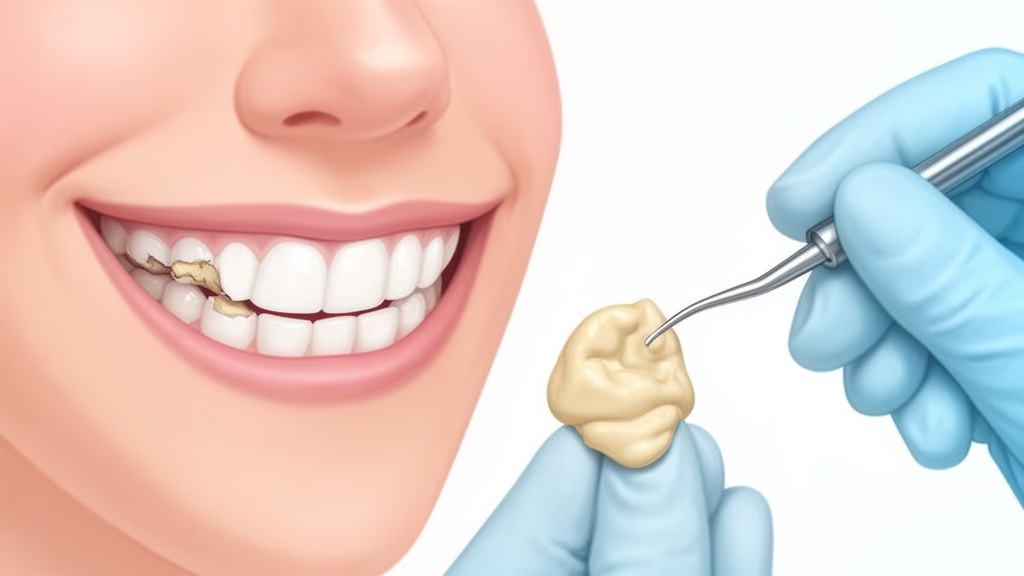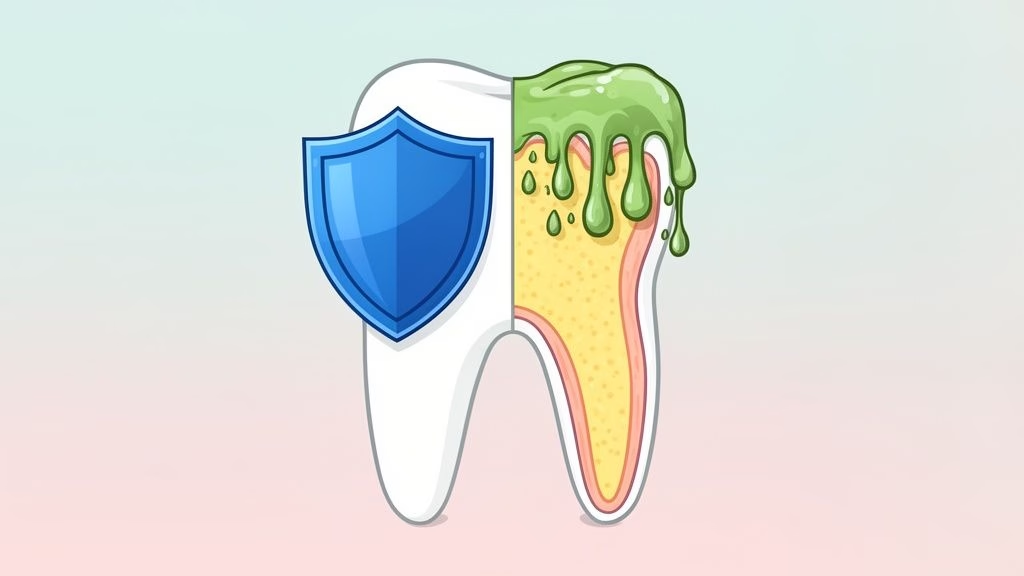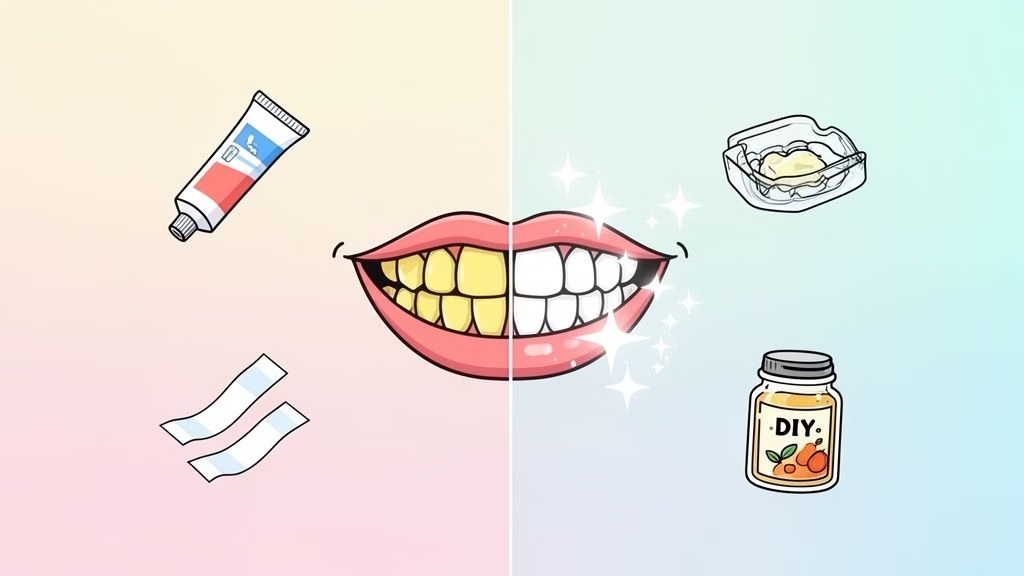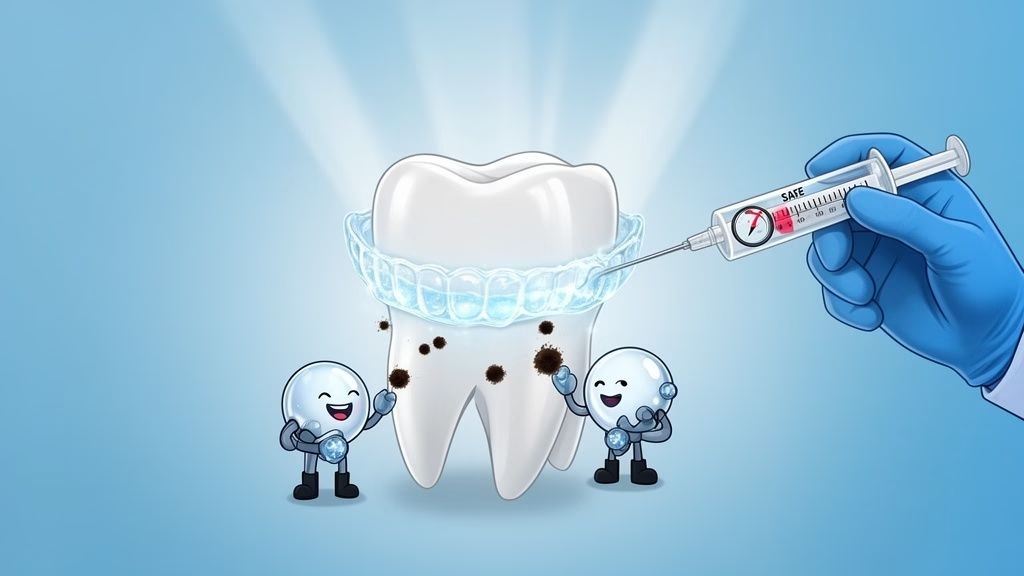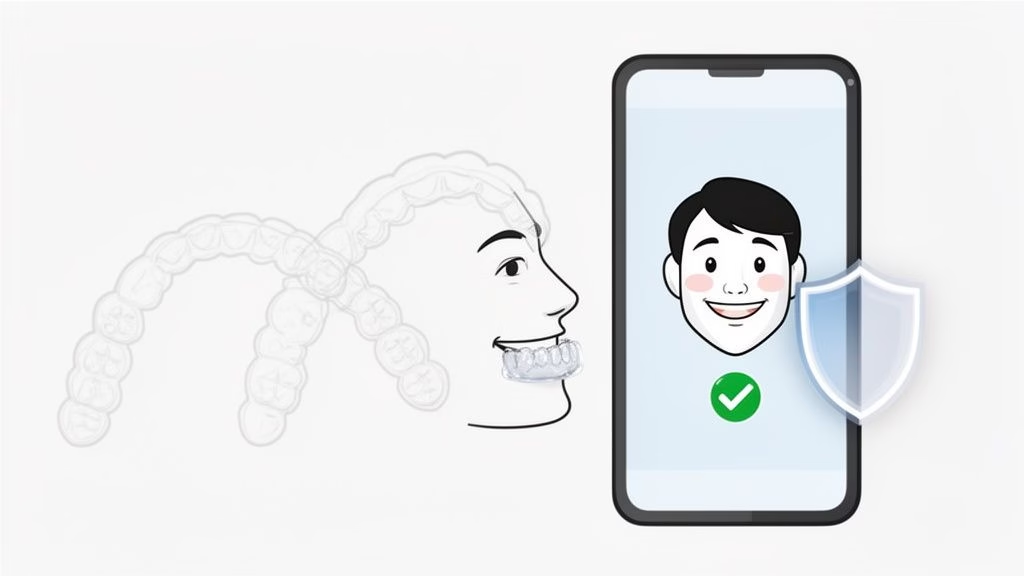How to Care for Dentures a Simple Guide

Caring for dentures is all about a simple, consistent daily routine. It really boils down to three core habits: rinsing after meals, giving them a proper brush, and letting them soak overnight. Getting this rhythm down is the secret to keeping your dentures clean, comfortable, and free from stains. It’s not just about how they look, but about protecting their fit and keeping your mouth healthy for the long haul.
Your Daily Denture Care Playbook
The best thing you can do to protect your investment is to establish a solid daily routine. It’s not complicated, I promise. We’re talking about small, consistent actions that quickly become second nature and prevent common problems like bad breath, staining, or a loose, uncomfortable fit.
This is especially true as dental technology moves forward. While innovations like digital dentures and 3D scanning are changing how fittings are done here in the UK, many of us still have traditionally made dentures. That makes your at-home care even more vital for getting the most life out of them.
If you have someone helping with your daily personal care, make sure your denture routine is part of the plan. Understanding broader caregiver responsibilities helps integrate these simple but crucial steps into your overall hygiene, so nothing gets missed.
The Non-Negotiable Morning Routine
Before your dentures go in, your mouth needs a bit of attention. It’s not just about feeling fresh; it’s about starting the day with a clean slate.
Overnight, bacteria can build up on your gums, tongue, and the roof of your mouth. The best way to deal with this is to take a very soft-bristled toothbrush (a separate one from your denture brush!) and gently brush all those soft tissues. This simple step gets the circulation going and removes any lingering plaque, creating a healthier surface for your dentures to sit on.
Once your mouth is ready, it’s time for the dentures. Take them out of their soaking solution and give them a good rinse under cool, running water. This washes away any leftover cleanser. Just be sure to never use hot water, as it can warp the material and ruin the fit for good.
Rinse After Every Meal
This is one of the easiest habits to pick up, but it makes a massive difference. Whenever you’ve finished eating or had a drink that might stain (like coffee, tea, or red wine), pop your dentures out for a quick rinse.
This simple act flushes away any food particles that might be trapped, preventing irritation and plaque. It genuinely takes less than a minute but goes a long way in keeping your mouth feeling clean and comfortable all day.
The Essential Nightly Cleanse
The most important part of your daily routine happens right before bed. Your dentures need to come out and be thoroughly cleaned every single night. No exceptions.
- Handle with Care: A word of warning from experience: dentures are fragile. Always clean them over a folded towel or a sink filled with water. Dropping them onto a hard ceramic or tiled surface is a recipe for a crack or a break.
- Brush Correctly: Grab your soft-bristled denture brush and a non-abrasive denture cleanser. It’s crucial you avoid regular toothpaste. The abrasive ingredients in most toothpastes can create microscopic scratches on the denture surface, which, over time, will attract stains and bacteria.
- Soak Overnight: After a good brush, your dentures need to soak. Popping them in a glass of cool water or a special denture-soaking solution is essential. This keeps the material from drying out, which can make it brittle and cause it to lose its shape. A warped denture is an ill-fitting denture.
Your gums need a rest, too. Keeping your dentures out for at least six to eight hours overnight allows your gum tissues to recover from the pressure of wearing them all day, reducing the risk of soreness and irritation.
To make this all a bit easier to remember, here’s a quick summary of the daily essentials.
Daily Denture Care At a Glance
| Action | When to Do It | Why It Matters |
|---|---|---|
| Clean Your Mouth | Every morning | Removes overnight plaque and stimulates gum circulation. |
| Rinse Dentures | In the morning & after meals | Washes off the soaking solution and removes food debris. |
| Brush Dentures | Every evening | Removes plaque and food, preventing stains and odour. |
| Soak Dentures | Overnight (6-8 hours) | Keeps them moist to prevent warping and material damage. |
Following these simple steps consistently will feel like second nature in no time and is the key to maintaining your dentures and your oral health.
Choosing the Right Products for Your Dentures
Walking into the dental care aisle can feel a bit overwhelming, can’t it? With rows upon rows of products, it’s easy to feel lost or, worse, grab something that could actually harm your dentures. Let’s cut through the noise and get straight to what you really need to protect your investment.
The products you use are just as important as your daily cleaning routine. In fact, using the wrong cleaner can be as damaging as not cleaning at all, creating tiny scratches that become magnets for stains and bacteria. We’ll look at selecting the best cleansers and adhesives, taking all the guesswork out of it.
Understanding Denture Cleansers
The first thing to realise is that dentures are not like natural teeth. They’re typically made from acrylic resin, a material that needs a gentle touch. This is why regular toothpaste is one of the biggest no-nos for denture care. Its abrasive ingredients are great for tough tooth enamel, but on the softer acrylic surface, they act like sandpaper, dulling the finish and creating micro-scratches where bacteria love to hide.
Instead, your cleaning kit should be stocked with products made specifically for dentures.
- Denture Brushes: These aren’t just a marketing gimmick. They have much softer bristles than a standard toothbrush and often a clever dual-head design—a larger brush for the main surfaces and a smaller, tapered one for getting into all those tricky little crevices.
- Non-Abrasive Denture Pastes or Gels: This is your go-to for daily brushing. These are formulated to shift plaque and food particles without scratching the denture surface. For extra peace of mind, look for products approved by the British Dental Health Foundation.
- Soaking Tablets and Solutions: For a really deep clean, these are brilliant. They fizz away, creating an effervescent action that helps lift stubborn stains and kill 99.9% of odour-causing bacteria. Remember, soaking is a powerful partner to brushing, not a replacement for it.
This simple infographic breaks down the core daily choices for keeping your dentures in top shape.
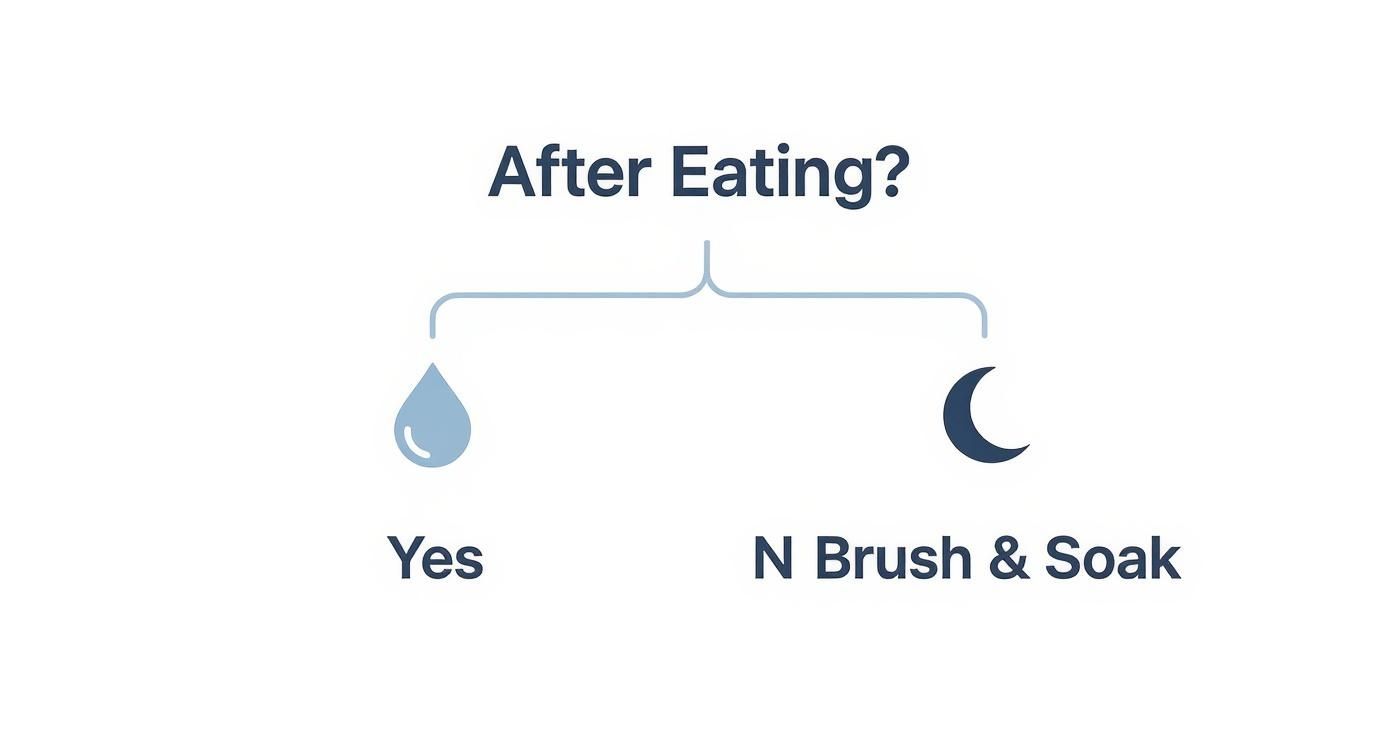
As you can see, a quick rinse after meals is a simple win, but the thorough brush-and-soak routine is what truly keeps them pristine overnight.
Products to Leave on the Shelf
Knowing what not to use is just as important. Some common household items and even certain dental products can cause irreversible damage, potentially leading to expensive repairs or a whole new set of dentures.
Critical Warning: Never use bleach, vinegar, or boiling water on your dentures. Bleach can weaken the structure and discolour the pink acrylic base. Vinegar is acidic and can corrode any metal clasps on partial dentures. And hot water? It can permanently warp the material, completely ruining that precise, comfortable fit.
When to Consider Denture Adhesives
Denture adhesives aren’t a sticking plaster for a poor fit. However, they can provide an extra layer of security and confidence, which is particularly helpful for new wearers or if you’ve experienced some natural jawbone resorption over time. They work by creating a thin seal between your gums and the denture, which helps keep pesky food particles out and improves stability.
If your dentures suddenly feel loose, that’s your cue to see a professional for an adjustment. While an adhesive might offer a temporary fix, it won’t address the root cause. Modern solutions are making this easier than ever. Instead of struggling to get an appointment, services like Toothfairy let you have an online consultation to assess the fit and discuss options. This is a much smarter approach than relying on adhesives long-term, which can mask problems that really need a dentist’s attention.
How to Choose and Use Adhesives Correctly
If you and your dentist decide an adhesive is right for you, using it correctly makes all the difference.
First, always start with clean, dry dentures. Then, remember that less is more. Use small dots or thin strips, keeping the adhesive away from the edges. Too much will just ooze out and be a pain to clean up.
It’s also wise to choose a zinc-free formula to avoid any potential health issues from long-term, excessive zinc intake. And finally, at the end of the day, make sure you clean every last bit of residue from both your dentures and your gums.
Making informed product choices is the bedrock of good denture care. By sticking to gentle, purpose-made cleaners and using adhesives only when appropriate, you’re setting yourself up for years of comfortable, functional, and great-looking dentures.
Handling and Storing Dentures to Prevent Damage
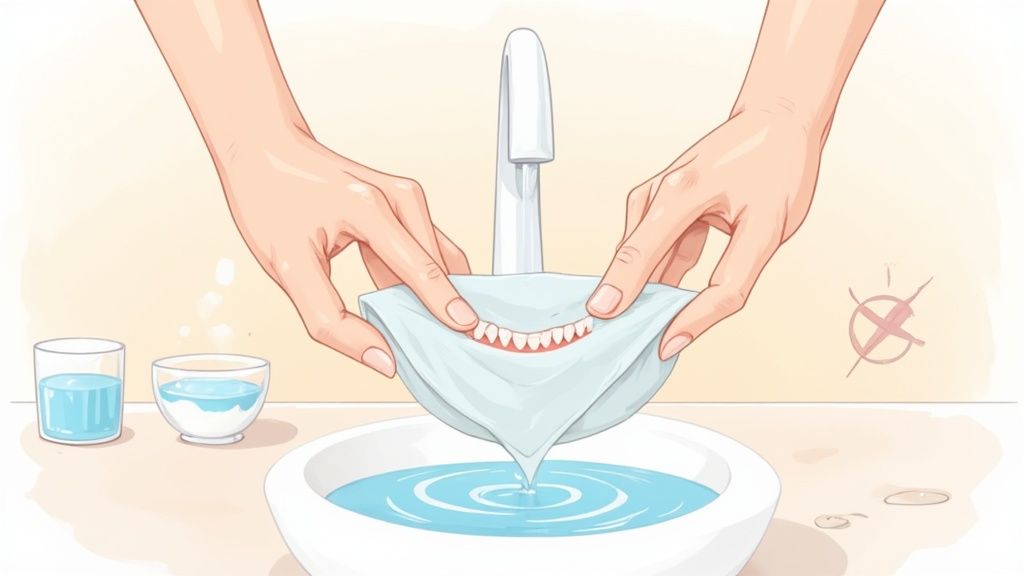
You’ve invested in your smile, and your dentures play a huge role in your daily life. But for all their strength, they can be surprisingly delicate. A simple drop can easily lead to a crack or a full-on break, meaning a costly trip to the dentist.
Learning how to handle and store them properly isn’t complicated, and it quickly becomes second nature. It’s all about building a few simple habits to protect them from damage and keep them fitting perfectly for years.
Create a Safe Zone for Handling
I can’t tell you how many times I’ve heard about dentures being dropped onto a hard sink or a tiled bathroom floor. It’s probably the most common cause of damage. The good news is, it’s almost entirely preventable.
Before you even think about taking your dentures out, create a soft landing spot. Here are two easy ways to do it:
- Lay a folded towel on the counter or in the bottom of the sink. It provides a simple cushion that will absorb the shock if they slip from your grasp.
- Fill the sink with a few inches of water. If they fall, they’ll just splash harmlessly into the water instead of hitting the hard ceramic.
Getting into one of these habits every single time is the single most effective thing you can do to avoid an unnecessary repair bill.
Impact fractures from being dropped are one of the leading causes of denture damage. The simple towel-in-the-sink trick costs nothing but can genuinely save you hundreds of pounds in repairs.
The Critical Role of Overnight Soaking
You might think soaking your dentures overnight is just about keeping them clean, but it’s just as crucial for their physical shape and strength. The acrylic material they’re made from is designed to stay moist. If you let it dry out, it can become brittle and much more likely to crack.
Even more importantly, dry acrylic can warp and lose its carefully moulded shape. A tiny, almost invisible change is all it takes to ruin that snug, comfortable fit. You’ll start to notice sore spots, rubbing, or a loose feeling. This is exactly why leaving them on the bedside table overnight is such a bad idea.
To store them correctly, they need to be fully submerged in a denture-soaking solution or just plain, cool water. This simple act keeps the acrylic hydrated, stable, and strong.
The Right Way to Store Your Dentures
Beyond just keeping them wet, proper storage is about keeping your dentures clean and, well, safe.
- Use a Dedicated Denture Case: A proper closed case is a must. It protects them from dust and bacteria floating around in the air. It also keeps them safely away from curious pets or small children – a hazard that’s more common than you might think.
- Avoid Extreme Temperatures: Hot water is the number one enemy of dentures. Never, ever use hot or boiling water for cleaning or soaking. The heat can permanently distort the acrylic, completely destroying the fit. Always stick to cool or lukewarm water.
- Be Mindful When Travelling: When you’re on the road, don’t just wrap your dentures in a tissue. That’s a surefire way for them to get mistaken for rubbish and thrown away. Always take your dedicated denture case with you to keep them protected and moist.
These straightforward habits are the foundation of good denture care. They ensure your dentures stay comfortable, fit properly, and remain in great condition for the long haul.
Keeping Your Gums and Mouth Healthy
It’s easy to focus all your attention on your dentures, but the real secret to a comfortable fit lies in the health of your mouth. Your gums, tongue, and palate are the foundation everything rests on. The healthier that foundation is, the better your dentures will feel day in, day out.
Before your dentures even go in, a simple morning routine can head off a lot of common problems. It’s a small shift in focus, but it makes a world of difference.
Your Morning Oral Health Ritual
Every morning, before you pop in your dentures, take a minute to clean your mouth. Grab a toothbrush with very soft bristles and gently brush your gums, your tongue, and the roof of your mouth.
This does two brilliant things. First, it sweeps away any plaque that’s built up overnight. Second, it gets the blood flowing in your gum tissues, which helps keep them firm and resilient. It’s the perfect way to prep your mouth for the day and seriously cut down the risk of irritation.
The Importance of a Daily Break
One of the best things you can do for your mouth is simply give it a rest. It’s crucial to take your dentures out for at least six to eight hours every day, and the easiest time to do this is while you sleep.
Wearing dentures puts constant, gentle pressure on your gums and the bone underneath. Giving them a break overnight lets those tissues recover, reduces inflammation, and allows your saliva to do its natural cleaning job. If you regularly skip this, you’re setting yourself up for chronic soreness and can even speed up bone loss over time.
Looking after your gums is just as important as looking after the dentures themselves. For a deeper dive, there are some great resources on oral health for older adults.
Managing and Preventing Sore Spots
Even with the best care, sore spots can happen, especially with new dentures. These tender areas are usually caused by uneven pressure. The moment you notice one, the first thing to do is take your dentures out to give the area a chance to heal.
A warm salt water rinse is a fantastic and simple remedy. Just mix half a teaspoon of salt into a glass of warm water and rinse gently to soothe the irritation and keep things clean.
If a sore spot doesn’t get better after a day or two of rest, or it keeps flaring up in the same place, that’s a signal your denture needs adjusting by a professional. Never, ever try to file it down yourself – you could cause permanent damage.
When to See a Professional
While your daily routine is vital, it doesn’t replace professional check-ups. The reality of UK dental care is that while the General Dental Council registers over 15,000 dentists, the system is under incredible strain. Many adults in England struggle to get regular NHS dental care, which means denture wearers might be missing out on essential check-ups and advice.
Don’t ignore the warning signs. Persistent soreness, a change in how your dentures fit, or anything else that feels unusual in your mouth means it’s time to see a dental professional. Small problems can quickly become big ones.
Getting an appointment can be a real headache. Thankfully, modern services like Toothfairy offer a more accessible way forward. You can have an online consultation with a dental professional to get expert advice on fit issues or oral health concerns, often without the long waits. It’s a smart, affordable way to get problems sorted before they get serious.
Knowing When to Seek Professional Help
Even if you follow your daily cleaning routine to the letter, there comes a time when you’ll need a professional eye. Your dentures were made to fit your mouth perfectly at a specific point in time, but our bodies are always changing. That’s why regular check-ins with a dental professional aren’t just a “nice-to-have”—they’re a non-negotiable part of keeping your dentures comfortable and functional for the long haul.
It’s easy to ignore the little things, but small signs of trouble are often your mouth’s way of telling you something’s up. Catching these early can save you a world of discomfort down the road.
Signs That Your Dentures Need a Professional Look
When your dentures don’t fit quite right, your body will let you know. The gradual changes in your jawbone and gums that happen as we age have a direct impact on how your dentures sit. Pushing through the discomfort isn’t a solution; it can lead to chronic soreness, make eating a chore, and even affect your facial appearance.
Keep an eye out for these tell-tale signs that it’s time to book an appointment:
- Looseness or Slipping: Are your dentures starting to move around when you talk or eat? If you find yourself reaching for denture adhesive more often than you used to, that’s a classic sign the fit has changed.
- Clicking Noises: A new clicking sound when you speak usually means your dentures are unstable and your bite is no longer properly aligned.
- Persistent Sore Spots: A bit of initial soreness with new dentures is normal. But if you have a sore spot that just won’t go away, it’s a sign of a pressure point that needs a professional adjustment.
- Difficulty Chewing: Suddenly struggling with foods you used to eat with ease? That’s a red flag that the fit and function of your dentures have shifted.
These aren’t issues that tend to fix themselves. In fact, wearing ill-fitting dentures can speed up bone loss in your jaw, which makes getting a good fit in the future even trickier. A professional reline or adjustment is really the only way forward.
The Lifespan of Your Dentures
Dentures work hard every day, but they aren’t designed to last a lifetime. With constant use, they inevitably wear down. As a general rule, a well-cared-for set of dentures has a lifespan of around five to seven years. Beyond that, the materials can become worn, porous, and less effective.
This is where regular check-ups are so valuable. A dental professional can spot subtle wear and tear that you might miss, and they’ll also check the health of your gums and the bone underneath. This ensures you can plan for a replacement before your old set starts causing problems.
Of course, getting that professional advice can be a challenge. Recent reports have shown that many NHS dental practices in England aren’t taking on new adult patients. This has left many people struggling to get the timely care they need, reinforcing just how important both good home care and finding accessible professional support are. You can learn more about the state of dental practice accessibility from this IBISWorld report.
Modern Solutions for Denture Adjustments and Replacements
The thought of waiting weeks for an appointment, especially when you’re in pain, is understandably frustrating. Thankfully, modern dental services are changing the game and offering a much more convenient way to get help.
Instead of being stuck on a waiting list, you can now get expert advice right from your own home. Services like Toothfairy are a fantastic alternative. Through an online consultation, you can have a video call with a qualified dental professional to discuss your concerns. They can help figure out if you need a simple adjustment, a reline to get that snug fit back, or if it’s time to start thinking about a new, better-fitting set of dentures.
This puts you back in the driver’s seat, letting you tackle problems as they arise. It’s a smarter, more efficient way to manage your denture care, helping you keep your smile comfortable and confident without the old-fashioned hassle. Think of it like the difference between traditional braces and some specific aligner brands—both aim for a great result, but the journey can be vastly different.
Your Top Denture Care Questions Answered
Even with a perfect daily routine, you’re bound to have questions. Getting to grips with denture care is a journey, not a destination, so let’s tackle some of the most common queries I hear from patients.
Is It Alright to Use Regular Toothpaste on My Dentures?
This is easily the question I get asked most often, and the answer is a very clear no. Standard toothpaste is made for tooth enamel, which is incredibly tough. It contains abrasives that are fantastic for polishing natural teeth but are far too aggressive for the softer acrylic your dentures are made from.
Using your usual toothpaste will etch microscopic scratches into the denture’s surface. You won’t see them at first, but over time, these tiny grooves become a perfect home for bacteria and a magnet for stains from coffee, tea, or red wine. You should always use a soft-bristled denture brush and a proper non-abrasive denture cleanser to keep them looking their best without causing damage.
How Long Will My Dentures Actually Last?
Dentures aren’t a “fit and forget” solution; they put up with a lot of daily wear and tear. If you look after them exceptionally well, you can generally expect a set of dentures to last somewhere between five and seven years. Beyond that, the materials can become worn and more porous, which makes them less hygienic and not as effective.
What’s even more crucial to realise is that your jaw and gums are constantly changing shape, albeit slowly. So, even if your dentures look okay, the fit will inevitably worsen over the years. This is precisely why regular dental check-ups are so vital—we need to assess both the condition of your dentures and the health of your mouth.
I often tell my patients to think of dentures like prescription glasses. Your “prescription” – the unique shape of your mouth – changes over time, so you’ll eventually need a new pair to ensure a comfortable fit and the best possible function.
What If My Dentures Suddenly Feel Loose?
A sudden change in how your dentures fit can be quite unsettling. This can happen for various reasons, like recent weight loss or just the natural, gradual reshaping of your jawbone. The very first thing you should do is book an appointment with your dentist or clinical dental technician to get it checked out. A poorly fitting denture isn’t just uncomfortable; it can lead to serious gum irritation, sores, and make eating a real challenge.
As a stopgap while waiting for your appointment, a bit of denture adhesive can offer some temporary security. But please remember, this is not a permanent solution. Over-relying on adhesives can easily mask an underlying issue that really needs a professional reline or adjustment to fix properly.
Struggling with loose dentures or thinking it might be time for a new set shouldn’t mean facing long waits for an appointment. Toothfairy provides a modern, convenient way to get professional advice right from your own home. Our online consultations connect you with qualified dentists to discuss your denture fit, go over your options, and find a solution that brings back your comfort and confidence. It’s a smarter, more affordable way to manage your dental health, whether for emergencies, cosmetic work, or even straightening your teeth. Find out more at https://www.toothfairyapp.co.uk.
Last updated on October 27, 2025

Toothfairy Care Team
Toothfairy, is the world's smartest dental app, that connects patients to a dentist for a range of issues, from emergencies, cosmetics, prescriptions to virtual exams.
Toothfairy Care Team
Toothfairy, is the world's smartest dental app, that connects patients to a dentist for a range of issues, from emergencies, cosmetics, prescriptions to virtual exams.

